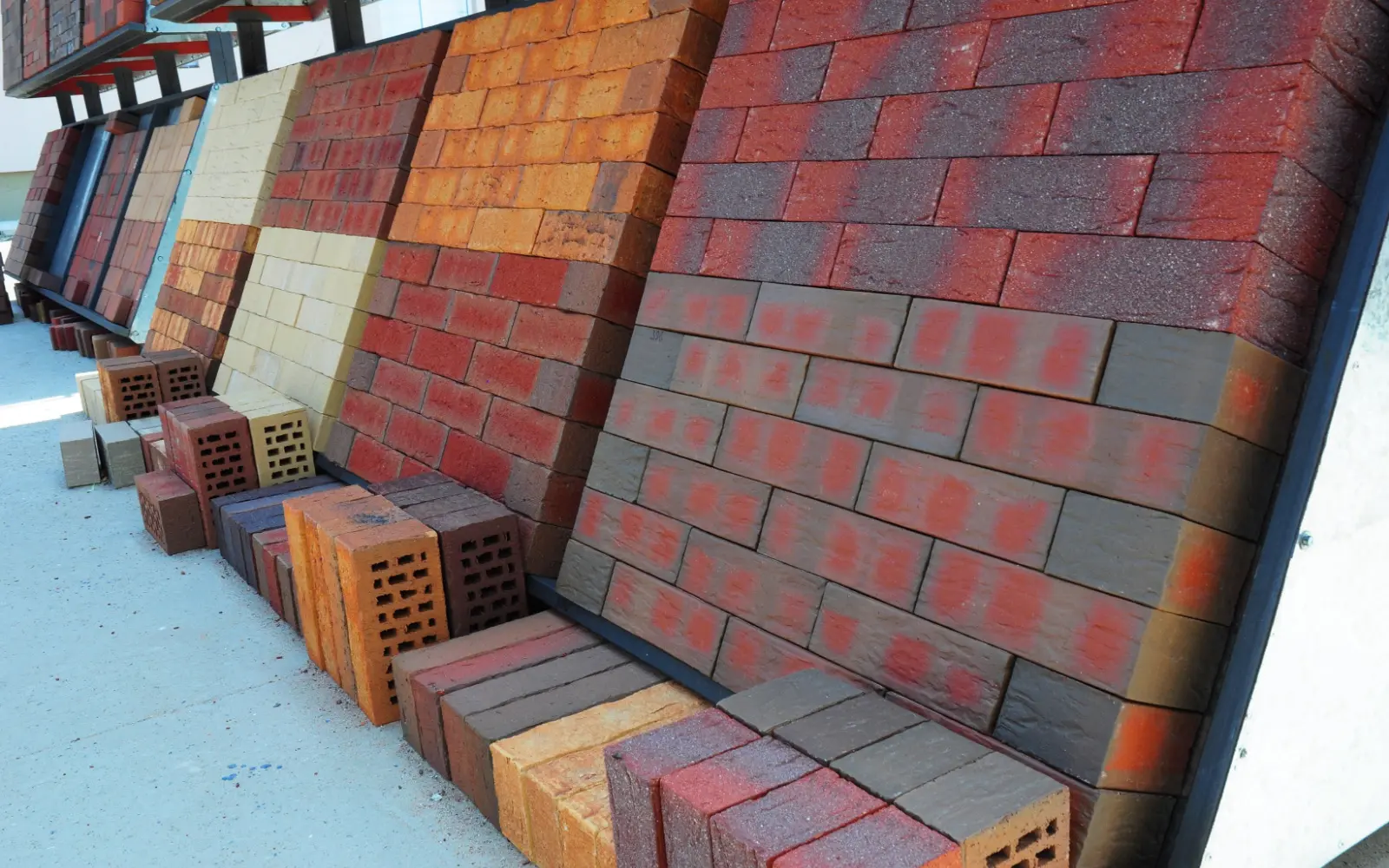Pavers can be worthwhile outdoor flooring and excellent alternatives to poured concrete.
This article discusses the ten types of pavers to help you choose the most suitable one for your walkways, patio, driveways, and more.
Types of Patio Pavers: A Summary
Pavers are available in numerous textures, designs, installation patterns, and shades.
They’re made from different materials, including concrete, brick, flagstone, travertine, rubber, marble, and cobblestone.
The most popular types include:
- Concrete pavers
- Brick pavers
- Bluestone pavers
- Cobblestone pavers
- Flagstone pavers
- Greencrete pavers
- Marble pavers
- Travertine pavers
- Granite pavers
- Rubber pavers
10 Types of Pavers for Your Outdoor Space
The best paver for your outdoor installation depends on the material you prefer the most. Read on to determine which paver suits your home and why.
1. Concrete Pavers
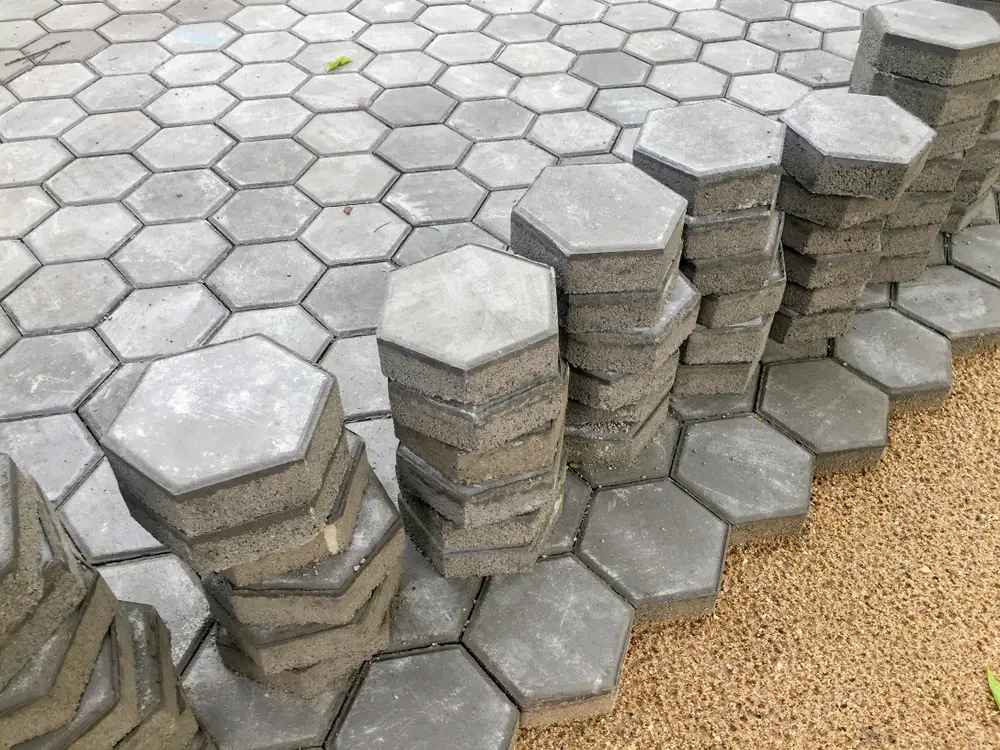
Nattiyapp/Shutterstock
Homeowners looking for more affordable and versatile outdoor flooring can opt for concrete pavers. Their wide range of sizes, shapes, colors, textures, and thicknesses make them the go-to option for most people.
Concrete pavers are ideal for walkways, driveways, and garages in residential and commercial buildings. Manufacturers mold these pavers by mixing sand, crushed stones, cement, and dyes and customize them into various shapes, colors, and sizes.
Unlike poured concrete, these pavers are sturdy and boost your home’s aesthetic quality. Installing concrete pavers is straightforward, making them ideal for any DIY enthusiast. Their uniform shapes and patterns make the installation process easy.
If you’re on a tight budget, selecting these pavers can keep installation costs low. Unfortunately, these pavers are susceptible to cracks and fading, so you should consider a regular maintenance program to keep them intact.
2. Brick Pavers
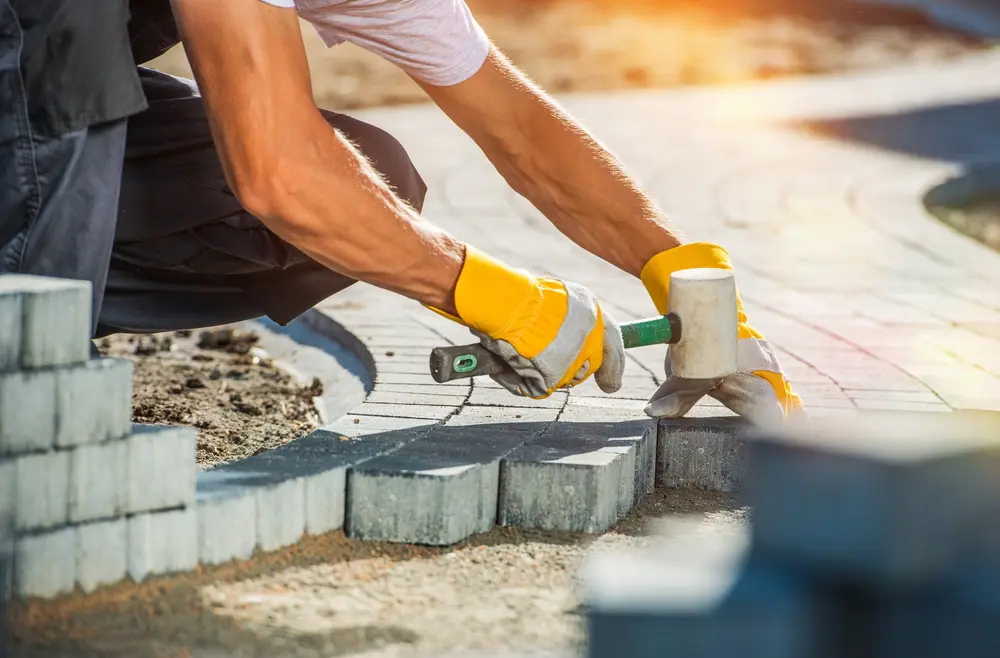
Virrage Images/Shutterstock
If you’re an eco-conscious homeowner looking for an alternative to concrete pavers, brick pavers can be your best choice. Homeowners prefer brick pavers due to their numerous styles, color combinations, and textures.
Brick paver manufacturers bake clay in a kiln and customize it into various shapes. Rectangular red bricks are the most common, but you can find varying shapes and colors.
You’ll find many modern-looking colors to match your contemporary or traditional buildings. Brick pavers are ideal for walkways, driveways, fireplaces, and patios. They’re affordable and easy to install.
You can lay them in various patterns during installation to make your flooring unique and visually pleasing. The only downside of these pavers is that they tend to crack after years of use.
3. Bluestone Pavers
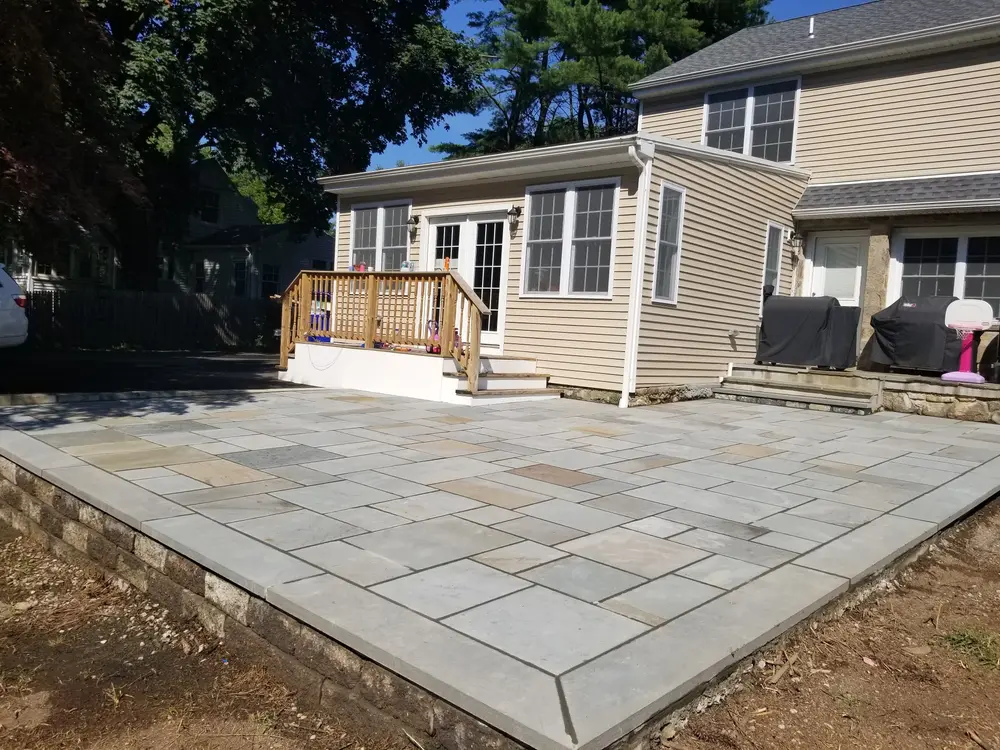
Angel Morquecho/Shutterstock
Bluestone pavers can create eye-catching and sustainable driveways. They’re available in many shapes and sizes to match and boost your property’s visual appeal.
Bluestone pavers are durable and provide a textured surface, making them suitable for outdoor projects. You can find them in large proportions, whether you prefer smaller tiles, bricks, or slabs in your driveway, walkway, or patio.
Bluestone manufacturers will also cut or mold them into a rectangular or round shape. You may choose bluestone pavers that are crushed and mixed with gravel to create a unique appeal.
The royal blue coloring in bluestone pavers makes them more outstanding while complementing other blue shades in your property. After prolonged exposure to sunlight, the blue hue will eventually turn light gray.
However, the light gray shade will still look appealing. Due to their numerous sizes, shapes, and unique colors, you can mix bluestone pavers with other types of pavers.
4. Cobblestone Pavers
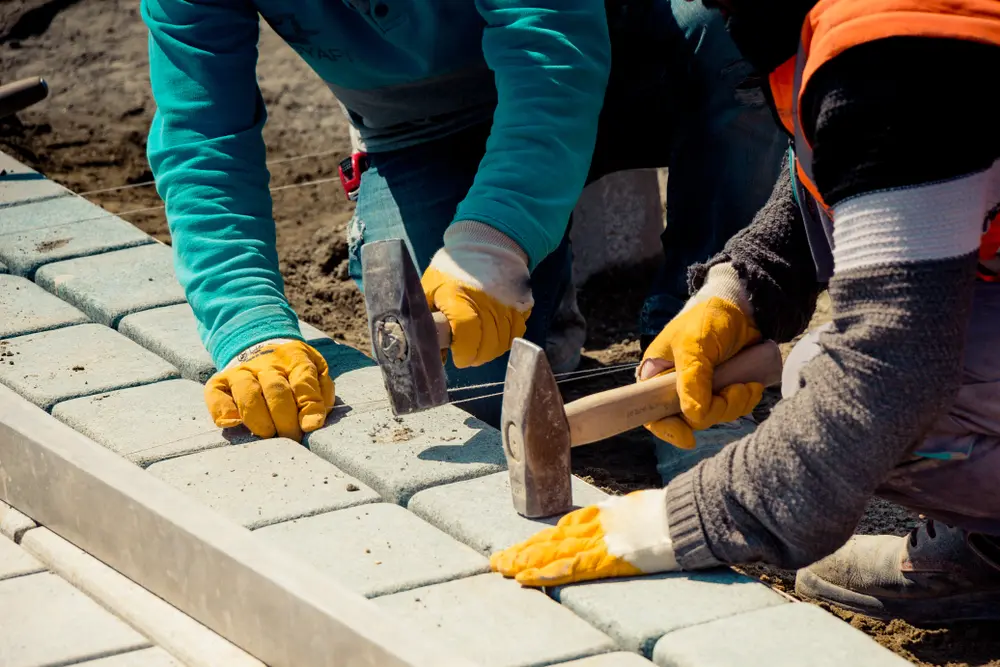
Berke/Shutterstock
Cobblestone pavers have existed for centuries thanks to their strength and durability. Their versatility and attractive aesthetics make them popular among homeowners.
You can install them in roadways, driveways, and fireplaces and expect them to last up to 100 years.
These pavers consist of granite, limestone, sandstone, or basalt. If you wish to install a unique paver, you’ll find cobblestones in various shapes and colors.
The numerous shapes and colors allow you to design your cobblestone pavers in distinctive patterns. Cobblestone pavers require significantly low maintenance and won’t incur damage due to usage or extreme temperature swings.
They’re readily available, affordable, and relatively easy to install. You only need to clean the stones once or twice a year to maintain their natural hue.
5. Flagstone Pavers
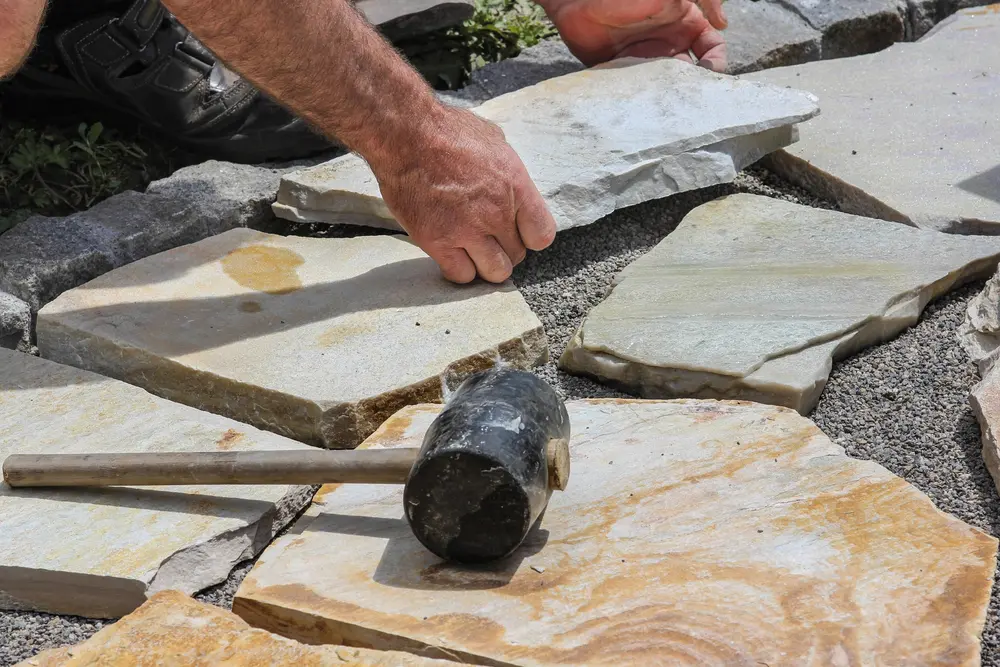
Marina Lohrbach/Shutterstock
Flagstone pavers can be an ideal choice for homeowners interested in adding naturally-looking features to their landscapes. As a naturally occurring sedimentary rock, flagstone pavers appear chic and ultra-classy.
They’re suitable paving stones to install on your patio, walkways, or garden. You can find these stones in a quarry in various shapes, sizes, and colors.
Most homeowners prefer irregularly-shaped flagstones to create numerous non-uniform patterns. You can also find these stones in shades of brown, gray, blue, and red.
Installing flagstone pavers can be labor-intensive, but once they’re installed, they’ll give your property a rich appeal. They have a non-slip surface, making them suitable in areas with high rainfall and snow.
6. Greencrete Pavers
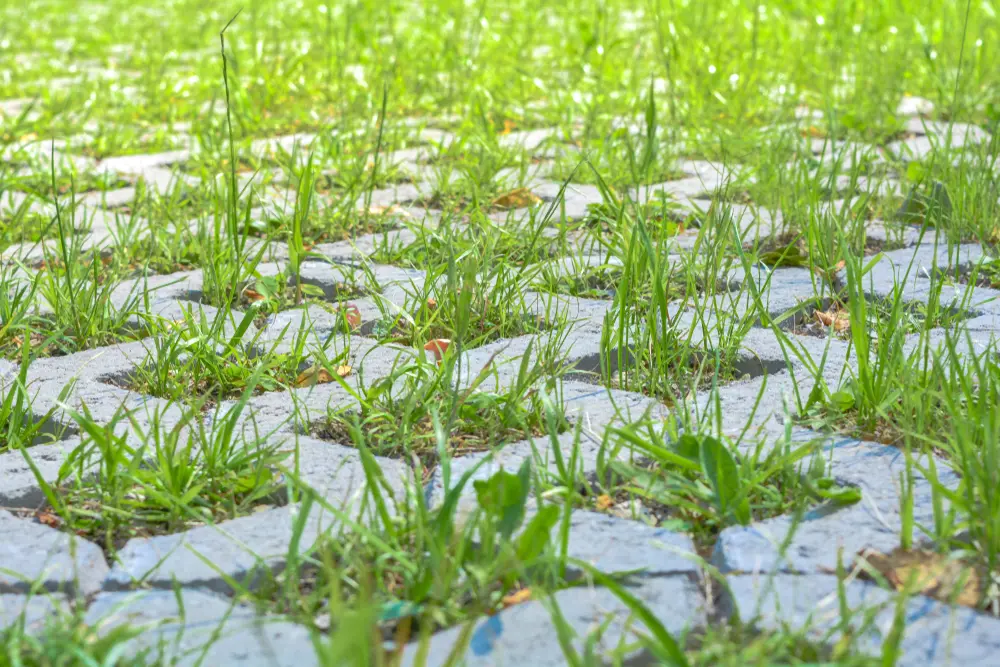
Koxae Sun/Shutterstock
Greencrete pavers are sustainable, unique, and eco-friendly paving materials to use at home.
They’re made from permeable materials, offering better drainage. Manufacturers design these pavers from natural resources like algae and industrial waste materials.
Homeowners use green concrete pavers as an alternative to concrete pavers. These pavers feature spaces between them for growing grass.
Nature lovers can create gorgeous patterns and natural, soothing looks with them. You can install Greencrete pavers in your yard’s driveway, walkway, patio, or other living spaces.
Their permeable nature makes them resistant to extreme weather changes. They’re also easy to install and will last longer if well maintained.
7. Marble Pavers
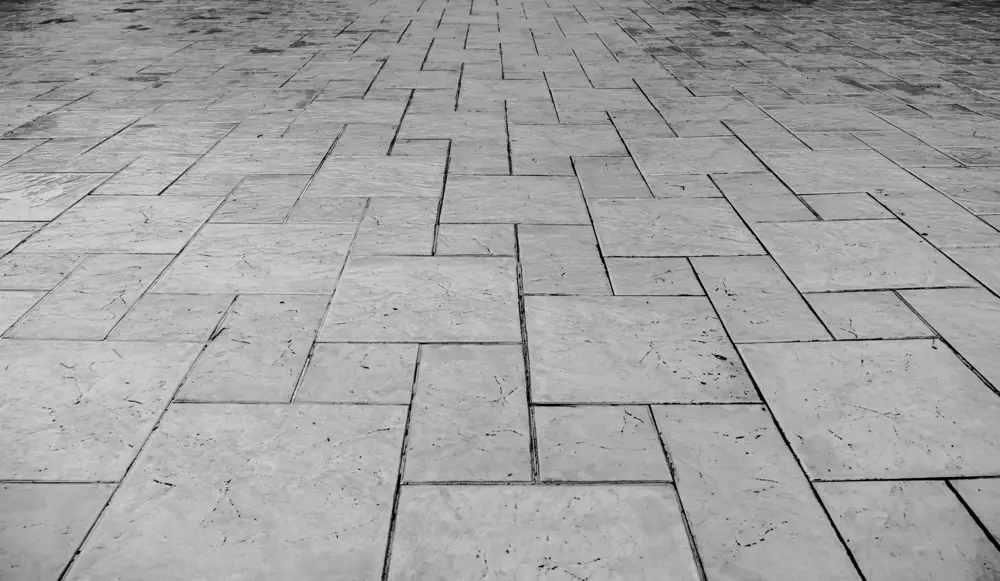
Glacee/Shutterstock
Marble pavers can be an excellent option if you’re looking for a high-end paving material to add a classy appeal to your property. Manufacturers make these materials by exposing limestone to high heat and pressure.
This process makes marble pavers have unique textures and patterns on their surface. To give them an elegant look, you can install marble pavers in your outdoor spaces, like patios, walkways, and driveways.
These beautiful pavers are available in shades of gray and white. Marble is durable and will last for decades if properly maintained. The downside of these pavers is that they’re non-porous, making them poor at water absorption.
You’ll also need to hire contractors with the proper installation skills to do the job. Marble pavers are slippery and not suitable for wet areas. They’ll also stain when exposed to acidic chemicals and get very hot on sunny days.
8. Travertine Pavers
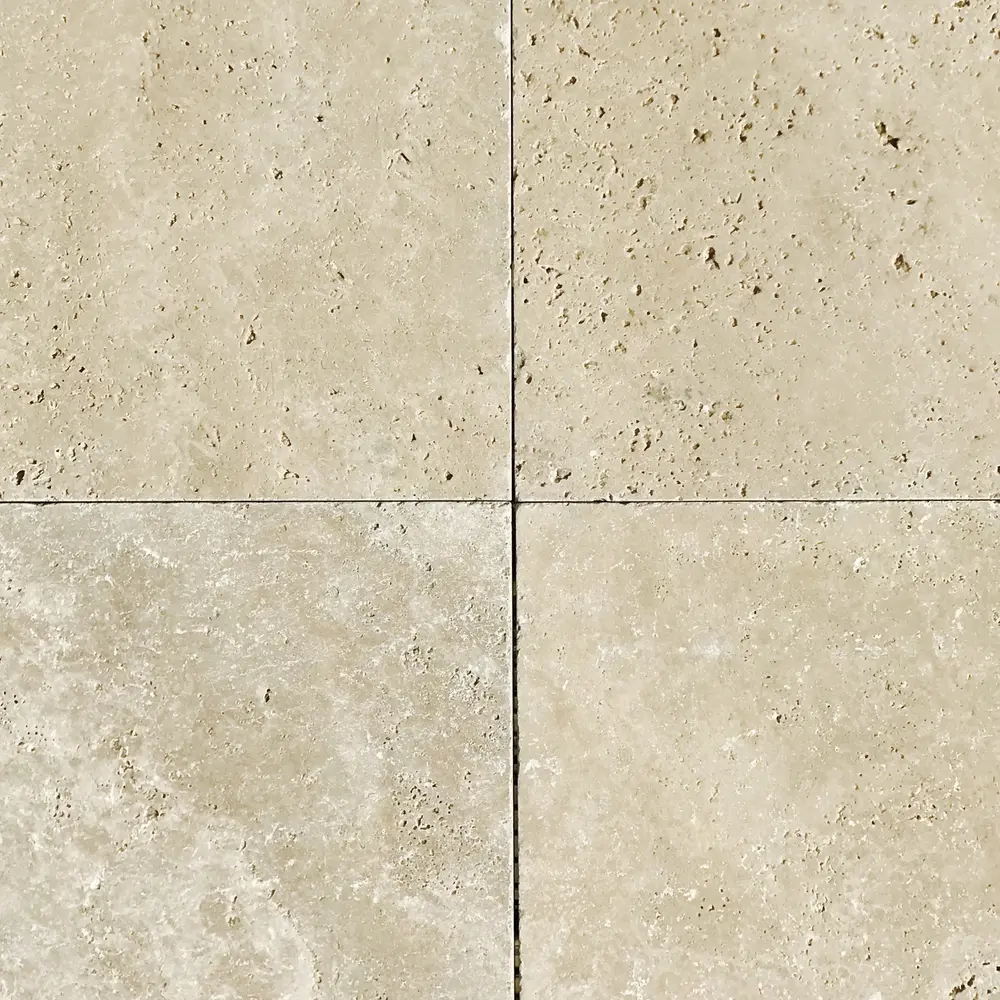
SRM Company/Shutterstock
Travertine pavers can be an excellent option for homeowners interested in a versatile, 100% natural, and eco-friendly material. They consist of naturally existing sedimentary rocks.
Travertine pavers are perfect for walkways, driveways, patios, garages, pool decks, and other outdoor applications. Their durability and strength make them a fantastic choice for anyone trying to boost their curb appeal.
Their dense texture allows them to last longer than brick or concrete pavers. Travertine pavers exist in various colors, making it possible to install them in unique and outstanding patterns. The material is weather-resistant and can insulate heat well.
You don’t have to worry about your pavers cracking or the surface getting hot. Remember to clean and maintain travertine pavers to keep them intact.
Thankfully, these pavers have a smooth surface, making it easy to clean them. Avoid using harsh cleaners such as vinegar. They may leave stains on the paver’s surface.
9. Granite Pavers
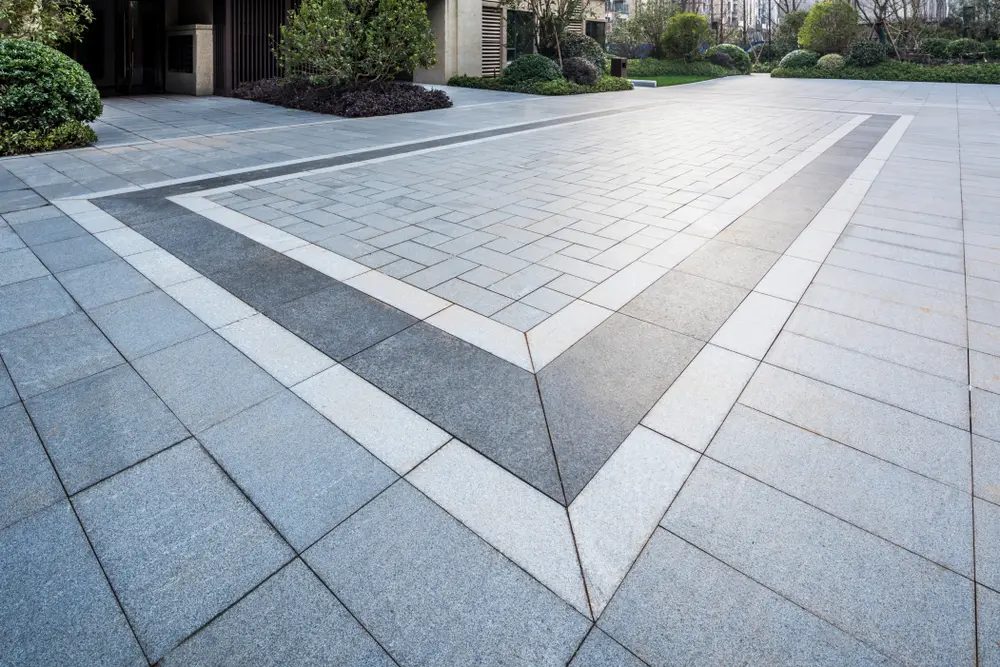
Hrui/Shutterstock
Granite is a naturally occurring volcanic rock that’s widely used throughout the world. Homeowners prefer this rock due to its incredible strength, aesthetic qualities, and longevity.
If you wish to boost your home’s outdoor appeal, you can install granite pavers and combine various colors to create unique patterns. As one of the strongest natural materials, you can install granite pavers in roadways, driveways, walkways, and fireplaces.
Granite is weather-resistant and will resist temperature swings. You also don’t have to worry about your pavers getting cracks, scratches, or stains. The material is fire-resistant and requires low maintenance.
You can easily clean it and repair scratches with a brush. However, granite is expensive and heavy to handle during installation. You’ll need to enlist a helping hand during installation, adding more expenses to your budget.
10. Rubber Pavers
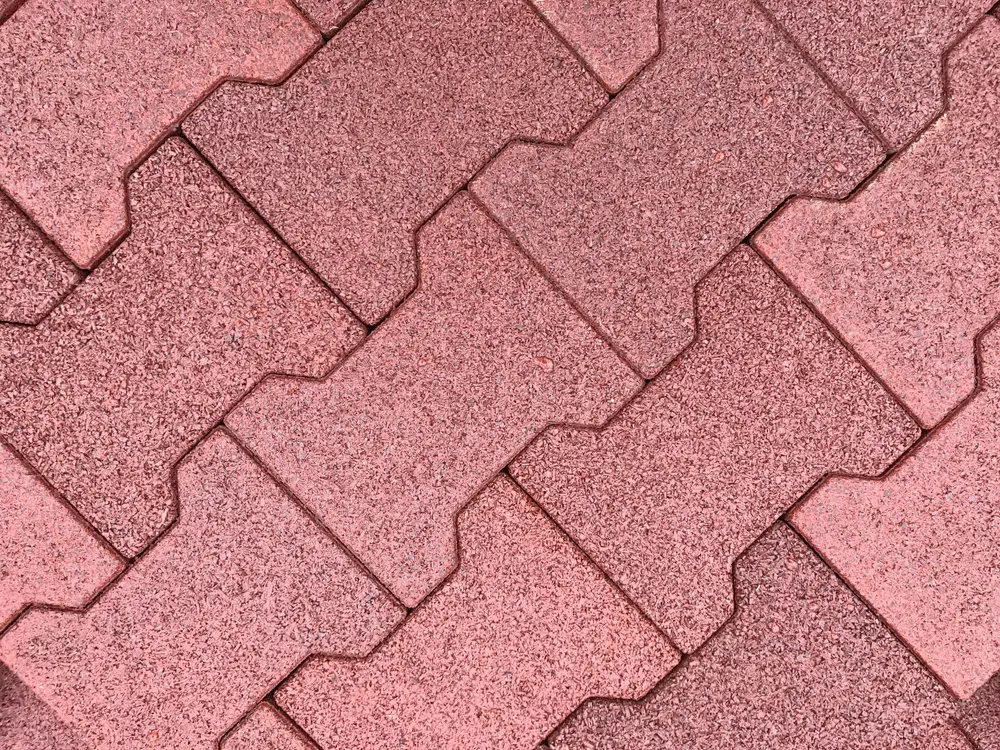
SRM Company/Shutterstock
Rubber pavers are a recent innovation. Manufacturers recycle rubber-made materials into sustainable pavers. These pavers are ideal for homeowners interested in cheap, eco-friendly, tear-resistant, and non-slip paving materials.
They are solid and imitate cobblestone and brick pavers. Rubber pavers can be your go-to option if absorption and traction are your primary concerns in your outdoor spaces. Thanks to their slip-resistant nature, you can install them in driveways, walkways, pool decks, and patios.
However, as a new material on the market, it’s hard to tell if rubber pavers are durable. They’re also susceptible to thermal expansion if installed in wet areas or under direct sunlight.
Things to Consider When Choosing Pavers
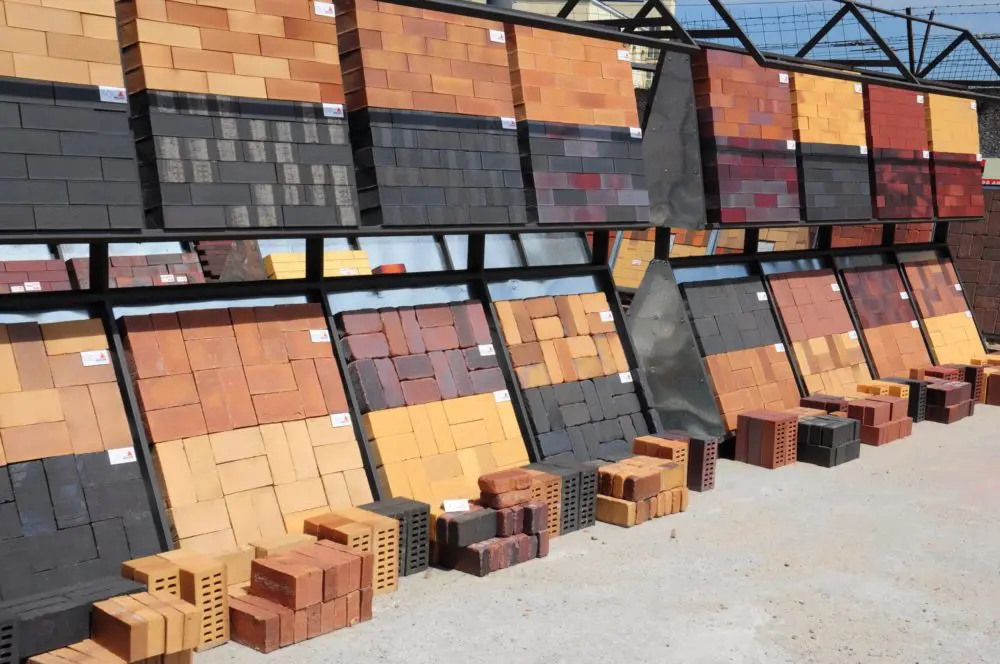
Radovan1/Shutterstock
Here are some things to put into consideration before choosing pavers for your home.
- Find pavers that will match your property’s architectural style.
- Select a versatile paver material that you can install in various spaces
- Choose pavers whose colors match or contrast some of your outdoor features
- Choose durable pavers that will serve you for decades
- Set a budget before selecting your favorite paving material
- Consider the maintenance needed for your paving material
- Consider how safe your paver is to walk or drive on
- Choose easy-to-install pavers if you’re planning a DIY project
- Find eco-friendly pavers if you’re an eco-conscious homeowner
Frequently Asked Questions
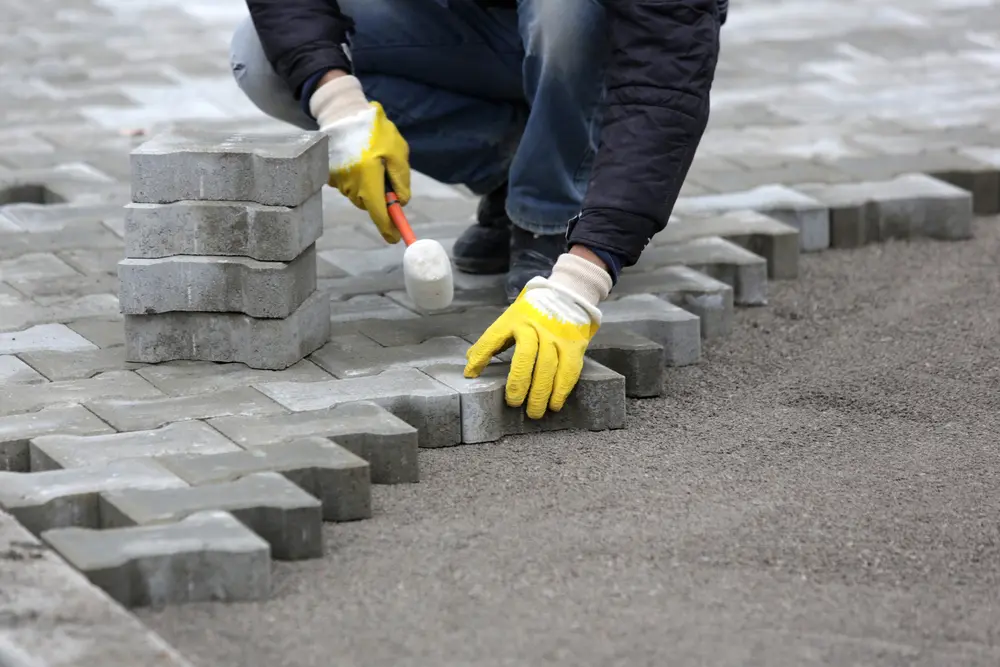
Belish/Shutterstock
Here are some of the most common questions about pavers:
What color pavers should I use?
Opt for shades that won’t clash. Alternatively, choose pavers that match the color of the materials that make your home.
Is it cheaper to pave or tile?
The cost of installing tiles in your outdoor spaces can be higher if you’ve not installed a concrete slab. However, installing tiles can be cheaper than pavers if the slab is ready.
Are pavers worth the money?
While some pavers tend to be costly, installing and maintaining them can be well worth your money. Pavers are durable and will last for decades. They also require low maintenance and boost your curb appeal thanks to unique patterns and striking colors.
Which pavers last the longest?
Cobblestone pavers are long-lasting and can serve for over a century. They are common paving materials in old towns and are ideal for walkways, driveways, and patios.
How do I stop my pavers from cracking?
You can stop your pavers from cracking by applying a sealer. Paver sealing will prevent your driveways, patios, pool decks, and walkways from cracking and keep them looking beautiful. You can also choose a more solid paver that’s not susceptible to cracking due to usage or temperature swings.
So, What Are the Best Types of Pavers?
The best pavers are concrete pavers, brick pavers, bluestone pavers, cobblestone pavers, flagstone pavers, green concrete pavers, marble pavers, travertine pavers, granite pavers, and rubber pavers.
Whether you want to install pavers in your patios, pool decks, driveways, or walkways, the above pavers can be your best option.
Choose durable, low-maintenance, and visually appealing pavers that suit your home. Happy landscaping!

